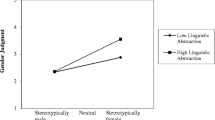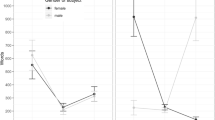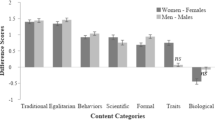Abstract
Differences between perceptions of men's and women's language were investigated. Undergraduates (64 male, 64 female) read 14 short stories with male or female speakers using seven categories of “male” and “female” language. Subjects then rated stimulus persons on 23 sex role related adjectives. Male language was rated as more masculine, less feminine, more “instrumental,” and less “socially positive” than female language. Effects were strongest for the categories of expletives and adjectives, followed by weaker effects for hedges and polite forms. Subjects rated males who spoke women's language as homosexual; they tended to rate females who spoke men's language as uppity. The results are discussed in terms of Robin Lakoff's hypotheses concerning linguistic sex differences and in terms of inrole vs out-of-role behavior.
Similar content being viewed by others
References
Bailey, L. A., & Timm, L. A. More on women's and men's expletives. Anthropological Linguistics, 1976, 18, 438–449.
Brouwer, D., Gerritsen, M., & deHaan, D. Speech differences between women and men: On the wrong track? Language in Society, 1979, 8, 35–50.
Broverman, I. K., Vogel, S. R., Broverman, D. M., Clarkson, R., & Rosenkrantz, P. Sex-role stereotypes: A current appraisal. Journal of Social Issues, 1972, 28, 59–79.
Cowan, G., & Koziej, J. The perception of sex-inconsistent behavior. Sex Roles, 1978, 5, 1–10.
Crosby, F., & Nyquist, L. The female register: An empirical study of Lakoff's hypothesis. Language in Society, 1977, 6, 313–322.
Deaux, K., & Emswiller, T. Explanations of successful performance on sex-linked tasks: What is skill for the male is luck for the female. Journal of Personality and Social Psychology, 1974, 29, 80–85.
Deaux, K., & Taynor, J. Evaluations of male and female ability: Bias works two ways. Psychological Reports, 1973, 32, 261–262.
Dubois, B. L., & Crouch, I. The question of tag questions in women's speech: They don't really use more of them, do they? Language in Society, 1975, 4, 289–294.
Dubois, B. L., & Crouch, I. The sociology of the language of American women. San Antonio, Texas: Trinity University Press, 1976.
Edelsky, C. The acquisition of communicative competence: Recognition of linguistic correlates of sex roles. Merrill-Palmer Quarterly, 1976, 22, 47–59.
Fillmer, H. T., & Haswell, L. Sex-role stereotyping in English usage. Sex Roles, 1977, 3, 257–263.
Firestone, S. The dialectic of sex. New York: William Morrow and Company, 1970.
Haas, A. Male and female spoken language differences: Stereotypes and evidence. Psychological Bulletin, 1979, 86, 616–626.
Israel, A. C., Raskin, P. A., Libow, J. A., & Pravder, M. D. Gender and sex-role appropriateness: Bias in the judgment of disturbed behavior. Sex Roles, 1978, 4, 399–413.
Kramer, C. Women's speech: Separate but unequal? Quarterly Journal of Speech, 1974, 60, 14–24. (a)
Kramer, C. Folklinguistics. Psychology Today, June, 1974, 82–85. (b)
Lakoff, R. Language and women's place. Language in Society, 1973, 2, 45–80.
Lakoff, R. Language and women's place. New York: Harper & Row, 1975.
Lao, R. C., Upchurch, W. H., Corwin, B. J., & Grossnickle, W. F. Biased attitudes toward females as indicated by ratings of intelligence and likeability. Psychological Reports, 1975, 37, 1315–1320.
McKee, J. P., & Sherriffs, A. The differential evaluation of males and females. Journal of Personality, 1957, 25, 356–363.
Sherriffs, A. C., & Jarrett, R. F. Sex differences in attitudes about sex differences. Journal of Psychology, 1953, 35, 161–168.
Sherriffs, A. C., & McKee, J. P. Qualitative aspects of beliefs about men and women. Journal of Personality, 1957, 25, 451–464.
Shinar, E. H. Person perception as a function of occupation and sex. Sex Roles, 1978, 4, 679–693.
Staley, C. M. Male-female use of expletives: A heck of a difference in expectations. Anthropological Lingusitics, 1978, 20, 367–380.
Timm, L. A. Review of Robin Lakoff's Language and women's place. Lingua, 1976, 39, 244–252.
Zeldow, P. B. (1976). Effects of nonpathological sex-role stereotypes on students' evaluation of psychiatric patients. Journal of Consulting and Clinical Psychology, 1976, 4, 3–4.
Author information
Authors and Affiliations
Additional information
The research reported here is based upon a thesis submitted by the first author to Tulane University in partial fulfillment of the requirements for a Master's degree. The support of Professors Larry Dachowski, William P. Dunlap and Edgar C. O'Neal, members of the thesis committee, is gratefully acknowledged.
Rights and permissions
About this article
Cite this article
Rasmussen, J.L., Moely, B.E. Impression formation as a function of the sex role appropriateness of linguistic behavior. Sex Roles 14, 149–161 (1986). https://doi.org/10.1007/BF00288246
Issue Date:
DOI: https://doi.org/10.1007/BF00288246




